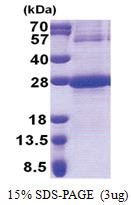NDUFB9 (1-179, His-tag) Human Protein
Other products for "NDUFB9"
Specifications
| Product Data | |
| Species | Human |
| Expression Host | E. coli |
| Expression cDNA Clone or AA Sequence |
MGSSHHHHHH SSGLVPRGSH MGSMAFLASG PYLTHQQKVL RLYKRALRHL ESWCVQRDKY RYFACLMRAR FEEHKNEKDM AKATQLLKEA EEEFWYRQHP QPYIFPDSPG GTSYERYDCY KVPEWCLDDW HPSEKAMYPD YFAKREQWKK LRRESWEREV KQLQEETPPG GPLTEALPPA RKEGDLPPLW WYIVTRPRER PM
|
| Tag | His-tag |
| Predicted MW | 24.2 kDa |
| Concentration | lot specific |
| Purity | >90% by SDS - PAGE |
| Presentation | Purified |
| Buffer | Presentation State: Purified State: Liquid purified protein Buffer System: 20 mM Tris-HCl buffer (pH 8.0) containing 0.4M Urea, 10% glycerol |
| Preparation | Liquid purified protein |
| Protein Description | Recombinant human NDUFB9 protein, fused to His-tag at N-terminus, was expressed in E.coli. |
| Storage | Store undiluted at 2-8°C for one week or (in aliquots) at -20°C to -80°C for longer. Avoid repeated freezing and thawing. |
| Stability | Shelf life: one year from despatch. |
| Reference Data | |
| RefSeq | NP_001265574 |
| Locus ID | 4715 |
| Cytogenetics | 8q24.13 |
| Synonyms | B22; CI-B22; LYRM3; MC1DN24; UQOR22 |
| Summary | The protein encoded by this gene is a subunit of the mitochondrial oxidative phosphorylation complex I (nicotinamide adenine dinucleotide: ubiquinone oxidoreductase). Complex I is localized to the inner mitochondrial membrane and functions to dehydrogenate nicotinamide adenine dinucleotide and to shuttle electrons to coenzyme Q. Complex I deficiency is the most common defect found in oxidative phosphorylation disorders and results in a range of conditions, including lethal neonatal disease, hypertrophic cardiomyopathy, liver disease, and adult-onset neurodegenerative disorders. Pseudogenes of this gene are found on chromosomes five, seven and eight. Alternative splicing results in multiple transcript variants. [provided by RefSeq, Jul 2015] |
| Protein Pathways | Alzheimer's disease, Huntington's disease, Metabolic pathways, Oxidative phosphorylation, Parkinson's disease |
Documents
| FAQs |
| SDS |
Resources
Recombinant Protein Resources |
{0} Product Review(s)
0 Product Review(s)
Submit review
Be the first one to submit a review
Product Citations
*Delivery time may vary from web posted schedule. Occasional delays may occur due to unforeseen
complexities in the preparation of your product. International customers may expect an additional 1-2 weeks
in shipping.






























































































































































































































































 Germany
Germany
 Japan
Japan
 United Kingdom
United Kingdom
 China
China
